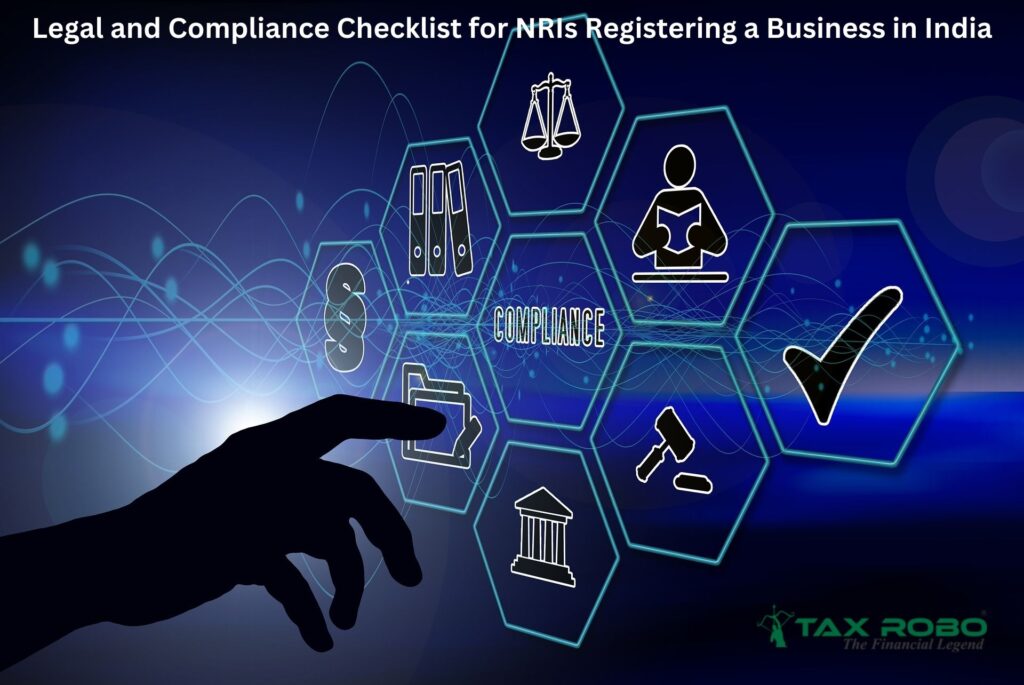Registering a business in India can be a lucrative opportunity for Non-Resident Indians (NRIs) looking to expand their ventures or investments back home. However, navigating through India’s legal and regulatory framework can be challenging. This blog provides a comprehensive legal and compliance checklist that NRIs should follow to ensure smooth business registration and operations in India.
1. Determine the Type of Business Entity
The first step in registering a business in India is deciding the type of entity that best suits the business goals. NRIs can choose from several business structures, each with its own legal and tax implications:
- Private Limited Company: Ideal for businesses seeking to raise capital and limit liability.
- Limited Liability Partnership (LLP): Offers flexibility in management and limited liability.
- Sole Proprietorship: Best for small-scale businesses with a single owner.
- Partnership: Suitable for businesses with multiple partners.
- Public Limited Company: For larger businesses aiming to list on the stock exchange.
2. Obtain a Digital Signature Certificate (DSC)
A Digital Signature Certificate (DSC) is required for submitting electronic documents to the Ministry of Corporate Affairs (MCA). NRIs must obtain a DSC from a certifying authority. This digital identity ensures secure transactions and legal validity for online business filings.
3. Get a Director Identification Number (DIN)
NRIs planning to become directors of a company must apply for a Director Identification Number (DIN) through the MCA portal. A DIN is a unique identification number for individuals appointed as directors of a company. This number is mandatory for legal compliance and identification.
4. Reserve a Business Name
Before registering a company, you need to ensure that your business name is unique and does not conflict with any existing trademarks. This can be done by checking the availability of the name on the MCA’s online portal. NRIs can also opt for a trademark registration if they plan to protect their brand.
5. Draft the Memorandum of Association (MOA) and Articles of Association (AOA)
The Memorandum of Association (MOA) defines the company’s objectives, while the Articles of Association (AOA) lays out the rules and regulations for governing the company’s internal affairs. Both documents are required to be signed and submitted for the business incorporation process.
6. Register with the Ministry of Corporate Affairs (MCA)
NRIs can incorporate their business with the Ministry of Corporate Affairs (MCA) by filing the required forms (SPICe forms) through the MCA portal. This process includes submitting details like business name, registered address, directors, shareholders, and capital structure. Once approved, the MCA issues a Certificate of Incorporation, which officially establishes the company.
7. Obtain Permanent Account Number (PAN) and Tax Account Number (TAN)
For tax purposes, the company must obtain a Permanent Account Number (PAN) and a Tax Deduction and Collection Account Number (TAN). PAN is essential for income tax filing, while TAN is required for the company to deduct or collect tax at source (TDS).
8. Register for Goods and Services Tax (GST)
If the business’s annual turnover exceeds the prescribed threshold limit, registering for GST is mandatory. This will enable the business to collect tax on sales and claim input tax credit. NRIs can also register for GST even if they do not meet the turnover requirement if they wish to avail of specific exemptions.
9. Comply with Foreign Direct Investment (FDI) Regulations
As an NRI, you may be eligible for Foreign Direct Investment (FDI) in India. However, there are certain compliance norms under the Foreign Exchange Management Act (FEMA) that you must adhere to. FDI in certain sectors is restricted or requires prior approval from the government.
- Automatic Route: Certain sectors allow automatic FDI, subject to compliance with local regulations.
- Government Approval Route: Some sectors require the government’s approval for FDI.
Ensure that your business activities comply with FDI policies, especially if the investment is substantial.
10. Register for Other Licenses and Permits
Depending on the nature of the business, additional licenses may be required to operate legally. These include:
- Shops and Establishment License
- Import Export Code (IEC) for businesses engaged in international trade
- Food Safety and Standards Authority of India (FSSAI) for food businesses
- Environmental Clearances for industries that impact the environment
- Labour and Employee-related Registration (e.g., Employee Provident Fund, Employees’ State Insurance)
11. Open a Bank Account
After business registration, NRIs need to open a business bank account in India. The account should be in the company’s name, and NRIs may be required to submit additional documents such as proof of identity, proof of address, and the Certificate of Incorporation. It is also important to select a bank that understands the requirements of NRIs and offers specialized services.
12. Ensure Compliance with Indian Labour Laws
If your business hires employees in India, you must comply with Indian labour laws. Some key regulations include:
- Payment of Gratuity Act
- Employees’ Provident Fund and Miscellaneous Provisions Act
- Maternity Benefit Act
- Payment of Bonus Act These laws protect workers’ rights and impose obligations on employers to maintain fair labor practices.
13. File Annual Returns and Financial Statements
Once the business is registered, it is important to stay compliant with filing annual returns and financial statements with the MCA. These include submitting Form 23AC (Balance Sheet) and Form 23ACA (Profit & Loss Account). Non-compliance may result in fines or penalties.
14. Adhere to Indian Taxation Rules
NRIs must also ensure compliance with Indian tax regulations, including:
- Income Tax: Taxable income for businesses in India includes income earned within the country. The business must file annual income tax returns.
- Transfer Pricing: If the business has international transactions, it must comply with transfer pricing regulations, which ensure that transactions between related parties are conducted at arm’s length.
15. Maintain Books of Accounts
It is essential to maintain accurate and updated books of accounts for legal and audit purposes. You will need to follow Indian Accounting Standards and ensure that records are available for government inspections when required.
Registering a business in India as an NRI is a rewarding opportunity, but it comes with its own set of legal and compliance requirements. Following the above checklist ensures that your business is legally sound, compliant with Indian regulations, and well-positioned for success. Consulting with legal and financial experts can provide additional assurance and guidance throughout the process.




Hello! This is kind of off topic but I need some advice from an established blog. Is it tough to set up your own blog? I’m not very techincal but I can figure things out pretty quick. I’m thinking about creating my own but I’m not sure where to start. Do you have any ideas or suggestions? Cheers
Those are yours alright! . We at least need to get these people stealing images to start blogging! They probably just did a image search and grabbed them. They look good though!